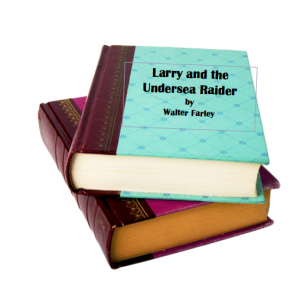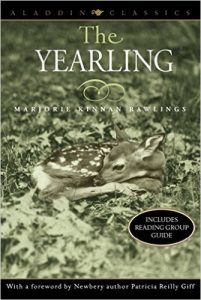
I JUST GOOGLED LARRY AND THE UNDERSEA RAIDER by Walter Farley, a book that one of my teachers read to her two classes. It probably didn’t have great literary value, but I’ve remembered that story—if not the setting. (I thought it was Norway. Turns out to be Hawaii, just prior to Pearl Harbor.)
Books have influenced my life dramatically (pun intended), and I’d like to introduce you to some of the authors who have helped people my imagination. Eugene Peterson says, “Imagination is that capacity within us to gather, arrange, and connect all the data of existence into something whole and right.” Sounds good to me.
The power books of my childhood include:
Johnny Tremain by Forbes (introduced me to the dramatic period preceding the Revolutionary War)
The Yearling by Rawlings (taught me the pain of real life)
Silas Marner by George Eliot (got me hooked on Classics)
I cut my reading teeth on The Bobbsey Twins, Nancy Drew, horse and cowboy stories and the like, but these heavier tales popped up as lighthouses to guide me into deeper waters.
What did I learn spiritually in those days? Around Confirmation time, my pastor gave me a small book called Five Minutes a Day by Robert E. Speer. That little book has continued to nurture me to this very day. The format is simple: one or more scriptures, a poetry segment, and an elegant prayer. The poets he drew from are the Heavy Duty/Extra Strength variety: George Herbert, Robert Browning, Francis Thompson, Christina Rosetti.
Here’s a squib by Tennyson (somewhat altered) that shows that a tale (Story) is a far more effective way of communicating Truth than even eloquent speech. Migrant workers, carpenters, grave diggers, storm-battered sailors—anyone can find Truth in Story.
Truth in spoken words shall fail,
But truth embodied in a tale
Shall enter in at lowly doors.
Which they may read who bind the sheaf
Or build the house, or dig the grave,
Or those wild eyes that watch the wave
In roarings round the coral reef.
That’s my goal as a writer: to speak Truth through Story in a way that reaches the heart of readers, whatever their station in life.
What childhood books are vivid in your memory?
Next time I’ll get into later years. What might nursing a baby have to do with books?
egus@me.com Would love to hear about your stories.



Dear Ellie,
That was a bingo! I hadn’t thought about Johhny T for many years but just the mention of the title brought back the great pleasure I got from that book; read and retread and retread.. And the Yearling fell into the same class of the well worn book. I wish I still had those copies. Silas was read but didn’t grab the same way.
Now I need to spend some time dredging up musty memories
Thanks
Like you, Ellie, I started off with every Nancy Drew story I could get my hands on, loving the example of an intelligent, adventurous girl who traveled the globe to help her lawyer dad help others by solving mysteries. A friend in 5th grade,1969-1970 for me, attracted my attention when I saw her pouring over a serious biography (by Robert Massie) on Tsar Nicholas and Empress Alexandra–this during the era of the Cold War. I begged her to let me borrow her copy and she kindly did. That was my entry into the larger literary world!
Stories! They seemed more real than my real life, when I lay on my stomach on the cool linoleum floor during summer vacation, lost in novels featuring children a bit older and more adventurous than I. These spunky young people overcame challenges without their parents’ help or permission! DADDY-LONG-LEGS, by Jean Webster, instilled in me a buoyant optimism I was determined never to lose. I think the orphan heroine Jerusha , (who hated her name, taken from a tombstone, and changed it to Judy) still lives in my psyche.
I just read a children’s biography of Benedict Arnold. I found out my childhood version of Arnold wasn’t quite right. I thought when he passed my house in the mountains of Maine he was running away as part of his treason. I didn’t realize that his expedition was pre -treason. The author actually was rather sympathetic to Arnold. Several times he attributed the victory of the Revolutionary War to Arnold’s actions. Poor Arnold, even though he seemed to lack in the better graces, he seemed to get pretty poor treatment from Congress, Congresses, other officers. Even then, life was more political than sensible. How God must weep at our foibles and sins.